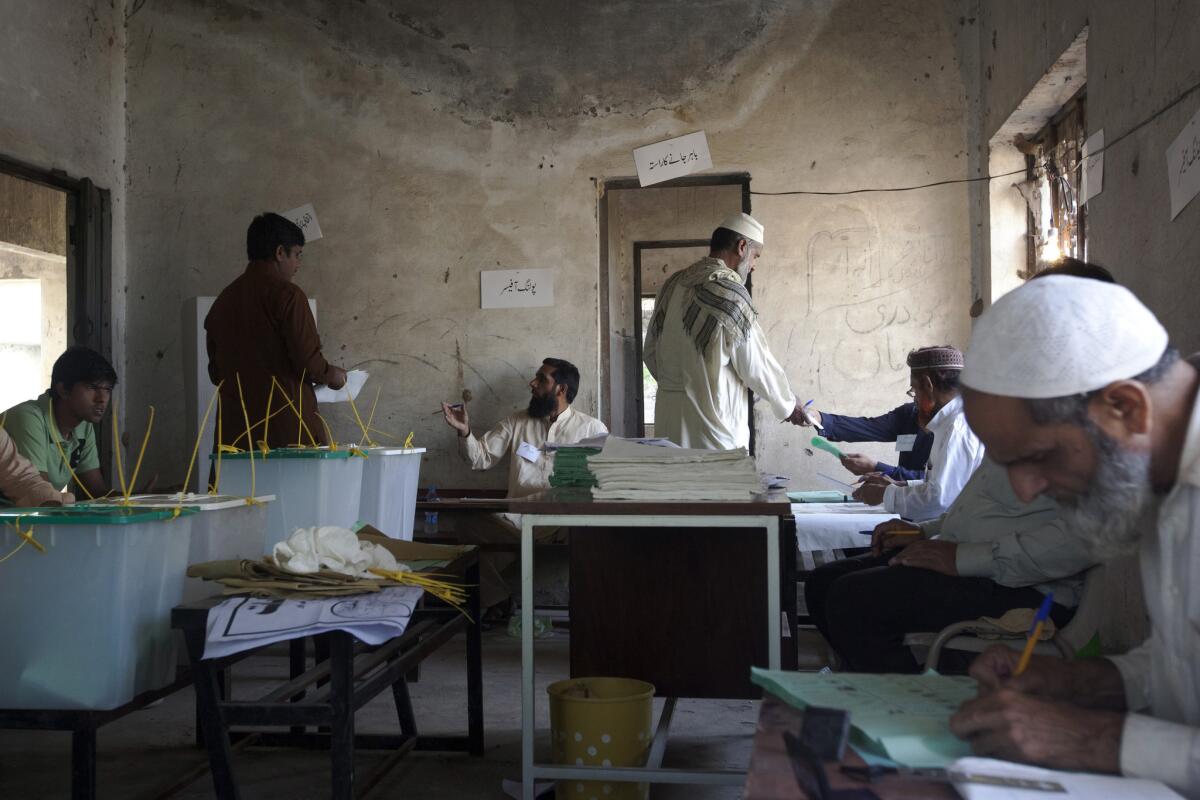Polls close in historic Pakistan elections; some bombings occur

- Share via
ISLAMABAD, Pakistan — After a bloody campaign season marred by waves of bombings and candidate assassinations, Pakistanis turned out in large numbers Saturday to elect a new parliament in what is slated to be the first democratic transition of civilian governments in a country with a history of military coups and forced political ousters.
The new national assembly that comes out of Saturday’s elections has the responsibility of choosing a new prime minister and charting a course that would lead Pakistan out of economic stagnancy and militancy that has resulted in thousands of deaths in recent years.
Members of the newly formed parliament and the provincial assemblies also will decide in the fall whether to select a new president or retain incumbent Asif Ali Zardari, the latter an unlikely scenario if his Pakistan People’s Party performs poorly in Saturday’s polls. Zardari’s term ends in September.
The campaign became a two-way battle between the PML-N Party led by former Prime Minister Nawaz Sharif and the Movement for Justice Party of onetime cricket star Imran Khan, who over the past decade had failed to muster any significant political support. That changed over the last year, as Khan he morphed into a dominant political force through a campaign that relied heavily on young, urban, middle-class voters, many of them social media savvy, and a furious schedule of rallies attended by legions of backers.
Pakistan’s other major political force, Zardari’s ruling Pakistan People’s Party, was forced by a variety of factors to run a subdued, relatively leaderless campaign. Zardari was kept from the campaign trail by court rulings that barred him from politicking while serving in the presidency. His 24-year-old son, Bilawal Bhutto Zardari, was supposed to help lead the campaign but stayed away because of militants’ threats to his life.
During the campaign, more than 100 candidates and activists were killed in a string of bombings and ambushes that occurred virtually daily.
The country’s homegrown insurgency, the Pakistani Taliban, focused most of its attacks on three liberal, secular parties, Zardari’s PPP, northwest Pakistan’s Awami National Party and the Muttahida Qaumi Movement, which governs Karachi, the country’s largest city. However, during the waning days of the campaign, Taliban insurgents expanded their hit list to include rallies held by Islamist hard-line parties led by clerics with historic ties to the Taliban movement.
Faced with threats from the Pakistani Taliban that it would use teams of suicide bombers to derail the elections, the government deployed 600,000 security personnel at the country’s 73,000 polling stations. The Pakistani military said the security contingent would include 75,000 army soldiers.
Voting proceeded calmly through most of the day, though there were bombing attacks in the southern port city of Karachi and in the northwest city of Peshawar.
In Peshawar, militants detonated a bomb outside a polling station, killing a child and injuring seven other people. In Karachi, a bomb went off outside a campaign office of the Awami National Party, killing 10 people and injuring 40 others. ANP is a liberal, Pashtun-dominated party that has governed the volatile northwest province of Khyber-Pakhtunkhwa over the last five years and has a presence in Karachi, home to a large enclave of Pashtuns. Police were still investigating how the bomb attack was carried out.
“We are left at the mercy of terrorists,” said Bashir Jan, an ANP leader based in Karachi. “We are being targeted to pave the way for extremist elements and guarantors of the Taliban to contest and win the elections.”
Despite the threats from the Taliban, turnout appeared to be robust across the country. In the capital, Islamabad, voters said they refused to be intimidated by warnings from militants and relished the chance to have their say in historic elections. Long lines at polling stations across the country prompted election officials to keep the voting booths open an additional hour.
“I was so excited about voting that I couldn’t sleep — I’ve been up since 4 a.m.,” said Faiza Shahid, 52, who voted for Khan’s party. “I really hope Imran Khan wins. We really need change. We are sick and tired of the people ruling us, and sick of the corruption.”
ALSO:
Former Guatemala dictator Rios Montt found guilty of genocide
Pakistan expels N.Y. Times reporter on eve of historic elections
18 dead in Turkey bomb blasts believed related to Syria conflict
More to Read
Sign up for Essential California
The most important California stories and recommendations in your inbox every morning.
You may occasionally receive promotional content from the Los Angeles Times.










